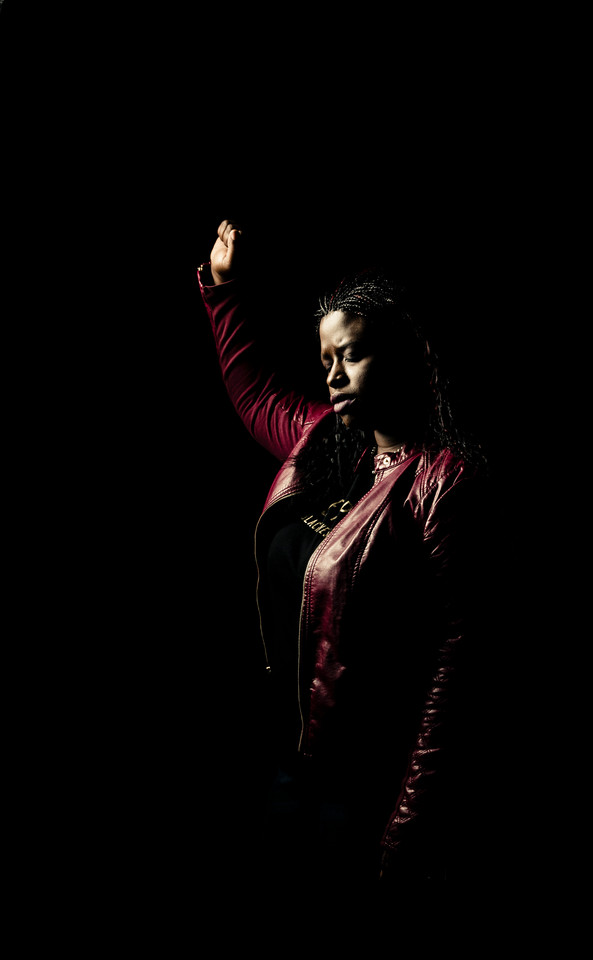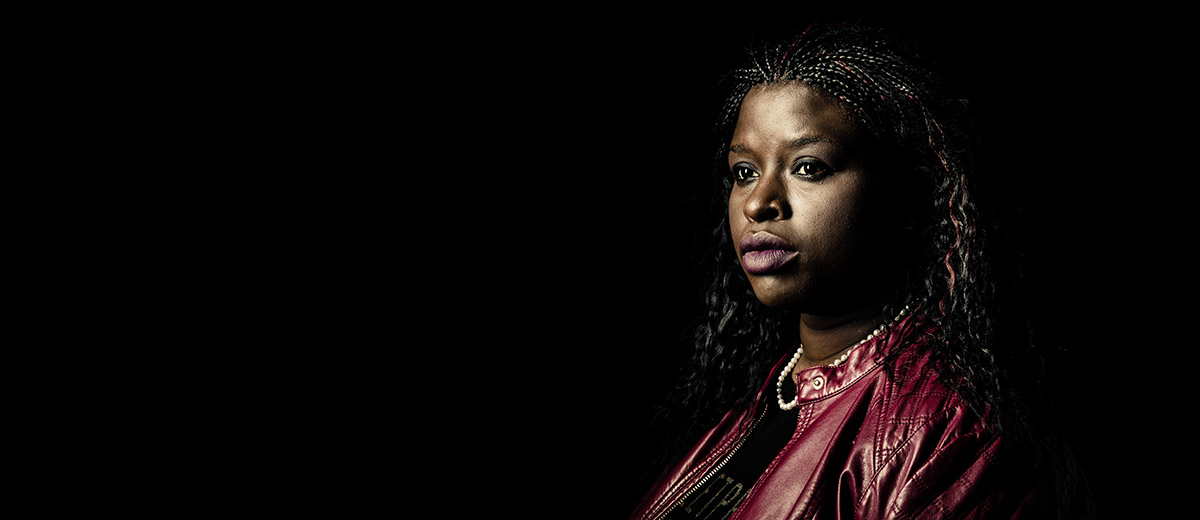Nekima Levy-Pounds sits at The Newsroom restaurant on Nicollet Mall in Minneapolis, one block from her office at the University of St. Thomas School of Law. Her hands carve through the air as she emphasizes her thoughts on injustice, moving in a sweeping motion as she accentuates a transition in someone’s thinking, and chopping downward as she puts an exclamation point on one of her own thoughts.
Her voice gains momentum with each point as she flexes the oratory skills developed at the head of classrooms, in front of microphones at rallies and from the pulpit at church.
Levy-Pounds’ passion is palpable – a glimpse into what has driven her to advocate for others. She is a dynamic and award-winning clinical professor of law, as well as a mentor and friend to dozens of students. She is the director of the law school’s Community Justice Project (CJP), an award-winning legal clinic aimed at improving lives in the African-American community in the Twin Cities. She is an agent of change for equality and justice in her community. She is a mother of five, two of whom are adopted.
She also is arguably the most recognizable face in the contemporary Twin Cities civil rights movement, furthered by her leadership role with the Black Lives Matter movement and her recent election as the president of the Minneapolis NAACP. She is a lightning rod for controversy and differing opinions; her outspokenness and disruptive actions draw the ire of some and praise and applause from others.
She is all of these things, but in conversations such as this it becomes clear one focus guides everything for Levy-Pounds: She is driven by her faith to pursue justice for those who do not have it, and she is willing to put everything she has into the effort.
"There is a fire absolutely burning inside of her,” said Virgil Wiebe, director of clinical education at the School of Law and Levy-Pounds’ colleague since 2003.
Early direction
Growing up in south central Los Angeles in the 1980s, Levy-Pounds witnessed the intersection of race and poverty, where gangs, scant resources and inequality dominated her neighborhood. Having seen television lawyers portrayed as people who could affect change and help others, precocious 9-year-old Levy-Pounds decided that was what she was meant to do.
A scholarship to boarding school on the East Coast helped her take a major step, but just before her freshman year a transformative event occurred: Her mother called to inform her a former classmate in Los Angeles, Latasha Harlins, had been shot and killed by a female store owner who had accused her of stealing. The woman served no jail time for the killing despite clear video evidence of Harlins being shot as she was walking out of the store – one of many perceived injustices that led to the famous Rodney King riots in 1992.
“Around the same time, a man kicked a dog and got 28 days in jail. These events kicked off comparisons of black life to the life of an animal, and the feeling that lives of animals were valued more,” Levy-Pounds said. “It had a huge impact on my life and on a lot of the work I do now, thinking about all the unarmed African-Americans who have been killed and a lack of widespread accountability even when those deaths are caught on video.”
The experience greatly influenced Levy-Pounds, and helped set a course for her formal education and career path. She majored in African-American studies at University of Southern California in Los Angeles, earned a law degree from University of Illinois College of Law and then worked a law fellowship in Washington, D.C. Levy-Pounds came to St. Thomas in 2003 to start the School of Law’s family law clinic and, despite success over its early years, soon realized that her heart was with another fight.
“One of the things I started to pay attention to after I lived here awhile was the inequality in quality of life between whites and African-Americans,” Levy-Pounds said. “If you’re African American or Native American and poor, you’re going to have a different experience.”
She immersed herself in the Twin Cities community, asking questions and gauging what she might do to help. She met with many leaders such as Nathaniel Khaliq, a longtime civil rights activist and former president of the St. Paul NAACP.
“I’ve had dozens of phone calls from folks at institutions of higher learning expressing interest and wanting to get involved. Ninety-nine percent of the time it’s been more or less an interview, and they get their information and go about their way,” Khaliq said. “Not with Nekima. This time was different. Nekima followed through.”
Khaliq and Levy-Pounds worked together in 2006 to address the issue of a disproportionate number of African-Americans in St. Paul being charged with obstruction of justice. By then, Levy-Pounds had launched the Community Justice Project to replace the Family Law Practice Group at the university’s School of Law.
Levy-Pounds and her students took on the legal research and advocacy that led to policy change regarding obstruction of justice – a striking example of the kind of process the young St. Thomas professor would use again and again over the next decade: work with the community to identify injustice; teach her students how to enact change; work with all available stakeholders and resources to fully grasp a solution; and then fight for it.
“That’s a different type of relationship from what you typically see with a law school and the community,” Levy-Pounds said. “We feel the community is our client, and we rely heavily on its feedback and insights so we’re not some distant institution that’s focused on our own goals. We want to know how we can leverage our skills and resources to make change out in the community.”
“It’s a hands-on, front-row seat of how you engage the community in issues of justice,” said School of Law dean Robert Vischer on the CJP’s societal issues focus. “The amount of time she invests in her students, and the model she provides on what a commitment to social justice can look like, really attract people.”
Black Lives Matter
 The years since have marked many victories for Levy-Pounds and the CJP, from successful policy changes, to dozens of dedicated students who affectionately call her “PLP” (professor Levy-Pounds), to the validation that has come in awards and recognition for the program’s innovations and its leader.
The years since have marked many victories for Levy-Pounds and the CJP, from successful policy changes, to dozens of dedicated students who affectionately call her “PLP” (professor Levy-Pounds), to the validation that has come in awards and recognition for the program’s innovations and its leader.
Levy-Pounds has not focused solely on the CJP, though: She has worked as the board chair of the Minnesota State Advisory Committee to the U.S. Commission on Civil Rights; as co-chair of Everybody In, which is working to close the racial unemployment gap; as a board member of the Minneapolis Foundation, Catholic Charities, the African American Museum, and Growth & Justice; and as the co-founder of Brotherhood Inc., a St. Paul-based nonprofit business aimed at supporting young African American men who have been involved in the criminal justice system or gangs.
“No two days are ever the same being with Nekima,” said Ngeri Azuewah, a third-year law student and CJP worker. “And she’s not different; she’s the same person throughout. She doesn’t have to censor herself; she knows she’s coming from faith and truth.”
Recently, Levy-Pounds has been thrust into the spotlight as she has become a major leader in the Twin Cities civil rights movement. Prolific on social media (she has more than 6,600 Twitter followers and nearly 4,000 Facebook friends), Levy-Pounds watched online as last year’s events of civil unrest played out following the shooting of Michael Brown in Ferguson, Missouri. She said she felt called to travel there as a legal observer during the height of the protests and clashes between police and citizens.
“(Ferguson) was a life-changing experience,” she said. “I had written about the war on drugs, the militarization of our police forces, criminal justice issues, but to be up close and personal in that situation and be tear gassed without warning, it showed me the significance of what we were facing with police issues.
“When I got back I was approached by young people about becoming involved in Black Lives Matter in Minneapolis. Before Ferguson I may have been more reticent, but it was a no-brainer at that point.”
Since then, Levy-Pounds has been an adviser and leader within the Black Lives Matter movement, helping organize and execute the march that temporarily closed down I-35 last December, as well as the Mall of America protest on Dec. 20. For that event she and several other organizers were criminally charged with misdemeanors that included trespassing, disorderly conduct and unlawful assembly, although the trespassing charges were later dropped. If convicted on any of the five remaining misdemeanor counts, Levy-Pounds faces a maximum sentence of 90 days in jail and a $1,000 fine.
“She was involved in organizing this event and telling people that it would be permissible to go to the mall and do this, and she was there and participated,” said Bloomington City Attorney Sandra Johnson, who added that the demonstrators were offered public space at the privately owned mall. “They were given choices, and they made an (illegal) choice. They knowingly and willingly broke the law,” Johnson said.
Such disruptive tactics and advocacy have spurred controversy and negative feedback toward Levy-Pounds and the law school, much of it voiced online on public forums. Some, such as former Minneapolis NAACP president the Rev. Jerry McAfee, say she is too focused on the issue of police brutality. Others have called for her to step down from her position at St. Thomas and voiced displeasure to Vischer because they disagree with a law professor breaking the law.
Vischer and the School of Law have stood behind Levy-Pounds’ tactics both inside and outside the classroom since she arrived at St. Thomas.
“When you have faculty leading efforts of social reform, that’s not a distraction from their teaching. That’s essential to their teaching,” Vischer said. “Sometimes respect for the rule of law requires bringing attention to injustices within the legal system, and sometimes bringing attention requires breaking the law in an open and respectful way. That can be hard for some members of the public to understand: How you can be a professor of law, yet break the law?
“We have a responsibility as lawyers to be discerning in how we engage the legal system as it exists, and how we envision what it could become in the future,” Vischer continued. “That means sometimes you’re going to have to push for changes that make people angry, and that’s OK. That’s not a departure from the tradition of the legal profession; that’s in keeping with the heart of what the legal profession has stood for, and that’s what Nekima’s doing.”
For her part, Levy-Pounds said she is thankful to be working at a place with a reputation “that’s strong enough to have a person like me on the faculty who is outside the box in the approach I take.”
“I don’t even bother with (the criticism),” she added. “I know my track record. I know I’ve been involved in all this stuff for years across a wide spectrum of issues: education, economics, criminal justice, police reform, the war on drugs, (the) impacts of these issues on kids and family. I don’t even pay attention to that (criticism).”
On a higher level, Levy-Pounds said she is guided not by what people may or may not think about her actions, but by faith.
“I’m going to tap into the power of God and see where he takes me. That has empowered me to do what I do,” she said. “People may have a certain perception of what I should be doing, but thankfully I don’t answer to them.
“It’s great to work at an institution where you can have faith as a guiding instrument for the work you do,” she added.
Providence

Levy-Pounds leads a reflection during her Community Justice Project clinic.
Back at The Newsroom, Levy-Pounds reflects on what she has done to this point and what she has left to do.
“I can’t believe we’re still here. It’s 2015 and we’re dealing with some of the basics when it comes to race relations and people’s understanding of race relations,” she said. “We are back in the stone age as far as willingness to come to terms with how deep the problems run. That frustrates me, because I feel we should be much further. On the flip side, it helps me see more clearly what my responsibility is. A lot of that is to awaken people to the truth, inform them, challenge them and challenge myself.”
As she talks, the voice of Paul McCartney can suddenly be heard over the restaurant’s speakers, softly singing “Blackbird,” a song he wrote in 1968 about the civil rights struggle in the United States.
Blackbird singing in the dead of night,
take these broken wings and learn to fly.
All your life,
you were only waiting
for this moment to arise.
Told of the song’s meaning, Levy-Pounds just smiles. Then, simply says, “Providence.”
“I feel God has positioned me to be doing this work,” she said. “Many people didn’t know I was doing this work and suddenly I’m out there in the public eye and they’re like, ‘Where did you come from?’ I’ve always been here. I have a track record you can go back and see, and it was God who positioned me to be ready when the moment came to step out.” Levy-Pounds’ whole life has led her to this point: the justice she constantly seeks, both for herself and others; the burning passion that fuels her seemingly tireless pursuit of the truth; and the faith that guides everything.
“You were only waiting for this moment to arise.”
Read more from St. Thomas magazine.







